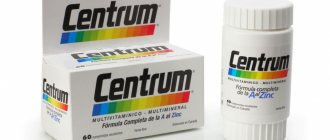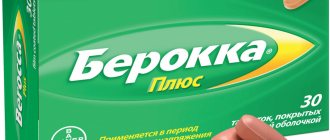Vitamins for pregnant women - how to choose the best? Comparing the most popular complexes
Everyone knows: a pregnant woman uses up her vitamins and minerals for two. However, today the range of vitamin and mineral complexes is so large that it is difficult not to get confused.
Which drug should I choose? To answer this question, it is worth carefully analyzing their composition.
What must be included in the complex for pregnant women? Are the dosages and forms of nutrients important?
For comparison, we have selected the most popular complexes intended for expectant mothers. Our rating includes 7 drugs: Alphabet Mom's Health, Complivit Mama, Pregnoton Mama, Vitrum Prenatal, Complivit Trimester, Elevit, Femibion.
A comparison of their compositions is given in the table.
| Complex | Vitamins | Minerals | Additionally |
| Alphabet Mom's health | Beta-carotene, B 1, B2, B5, B6, folic acid, B12, PP, C, D3, E, K, biotin | Electrolytic iron, copper, magnesium, manganese, selenium, zinc, molybdenum, calcium, chromium, phosphorus, iodine | L-taurine |
| Vitrum Prenatal | A, B1, B 2, B6, folic acid, B12, PP, C, D3, E | Iron (fumarate), calcium, zinc | |
| Complimentary Mom | A, B1, B 2, B6, folic acid, B12, PP, C, D2, E | Iron (fumarate), calcium, magnesium, phosphorus, copper, zinc, manganese | |
| Complivit Trimester (I, II and III) | A, B1, B 2, folic acid, B5, B 6, B12, PP, C, D3, E, P | Iron (fumarate), copper, selenium, manganese, calcium, magnesium, zinc, iodine | Lipoic acid, lutein |
| Pregnoton Mom | B1, B2, B3, B5, B 6, folic acid + calcium L-methylfolate, B12, C, D3, E, biotin | Iron in liposomal form, iodine, selenium, zinc | Omega-3 DHA |
| Femibion Natalcare (1 and 2) | B1, B 2, B5, B6, folic acid + L-methylfolate, B12, PP, C, E | Iodine | Omega-3 DKG (only in Natalcare 2) |
| Elevit Pronatal | A, B1, B 2, B6, folic acid, B12, PP, C, D3, E, biotin | Iron (fumarate), calcium, phosphorus, magnesium, zinc, calcium, copper, manganese |
The first thing to note is the wide variety of micronutrients. A number of complexes include, in addition to vitamins and minerals, other important substances - such as Omega-3, taurine, lutein. A more detailed study reveals that each complex includes folic acid, but iodine, which regulates the functioning of the thyroid gland, is not present everywhere. The same can be said about calcium and iron. This means that simply by comparing formulations, we will not be able to choose the best drug. Therefore, we will have to investigate the issue deeper.
Most experts believe that the most important micronutrients during pregnancy are folic acid, iodine, and iron. Omega-3 PUFAs are often added to them. Let's study what effect this four has and whether it is present in popular drugs.
Folic acid: what is important?
Folic acid, or vitamin B9, is the most important vitamin for pregnant women. Our mothers and grandmothers also took it during the period of bearing a child. It is not surprising that vitamin B9 is included in all vitamin complexes for expectant mothers.
Folic acid deficiency can cause serious developmental problems in the fetus:
1. In the first trimester, a lack of vitamin B9 is especially dangerous, because it can cause a defect in the closure of the neural tube, spina bifida, and underdevelopment of the brain.
2. In the second trimester, folic deficiency leads to disturbances in the development of the heart, blood vessels, and organs of the urinary system.
3. In the third trimester, a deficiency of this vitamin affects the child’s growth and brain health.
Unfortunately, a lack of vitamin B9 is genetically determined in half of the population of our planet. About 50% of people do not produce enough of the enzyme needed to convert folic acid into its active form, methylfolate. There are also those who do not synthesize the enzyme at all - their number (according to various estimates) is from 5 to 25%. These people should only take methylfolate. It is absorbed regardless of genetic characteristics, that is, deficiency will not occur.
The active form of vitamin B9 - methylfolate - is contained in only two drugs: Femibion and Pregnoton Mama.
Complivit Mama for pregnant and lactating women
Trade name: Complivit “Mama” for pregnant and nursing women International name: Multivitamins+Multimineral Pharmacological group: multivitamin + minerals Pharmacological group according to ATC: A11AA04. Multivitamins and microelements Pharmacological action: multivitamin, hematopoietic, metabolic Pharmacodynamics: Combined multivitamin preparation with micro- and macroelements, the effect of which is determined by the effects of its constituent components. Tocopherol (vitamin E) has antioxidant properties, maintains the stability of red blood cells, prevents hemolysis, and has a positive effect on the functions of the gonads, nervous and muscle tissue. Vitamin E deficiency in early pregnancy can cause miscarriage. Retinol (vitamin A) plays an important role in redox processes and is involved in the synthesis of mucopolysaccharides, proteins, and lipids. Promotes normal spermato- and oogenesis, development of the placenta, growth, normal development and differentiation of embryonic tissues, incl. epithelial structures and bone tissue. Participates in the formation of visual pigments necessary for normal twilight and color vision, ensures the integrity of epithelial tissues, and regulates bone growth. Thiamine hydrochloride (vitamin B1) as a coenzyme is involved in carbohydrate metabolism and the functioning of the nervous system. Riboflavin (vitamin B2) is an essential catalyst for cellular respiration and visual perception. Pyridoxine hydrochloride (vitamin B6) as a coenzyme takes part in protein metabolism and the synthesis of neurotransmitters. During pregnancy, it is necessary for women who have previously taken oral contraceptives, which deplete pyridoxine reserves in the body. Cyanocobalamin (vitamin B12) is involved in the synthesis of nucleotides, is an important factor in normal growth, hematopoiesis and development of epithelial cells, and is necessary for the metabolism of folic acid and myelin synthesis. Nicotinamide (vitamin PP) is involved in the processes of tissue respiration, fat and carbohydrate metabolism. Ascorbic acid (vitamin C) ensures collagen synthesis, participates in the formation and maintenance of the structure and function of cartilage tissue, bones and teeth, affects the formation of hemoglobin, and the maturation of red blood cells. Vitamin C increases the body's resistance to infections and reduces inflammatory reactions. Calcium pantothenate, as a component of coenzyme A, plays an important role in the processes of acetylation and oxidation, promotes the construction and regeneration of epithelium and endothelium. Folic acid takes part in the synthesis of amino acids, nucleotides, nucleic acids, and is necessary for normal erythropoiesis. In the early stages of pregnancy, it reduces the risk of developing neural tube defects in the fetus. Iron is involved in erythropoiesis, as part of hemoglobin it ensures the transport of oxygen to tissues, prevents the development of anemia in pregnant women, especially in the second and third trimesters of pregnancy. Copper prevents anemia and oxygen starvation of organs and tissues, helps prevent ospeoporosis, and strengthens the walls of blood vessels. Manganese has anti-inflammatory properties and prevents the development of osteoarthritis. Zinc is necessary for the normal formation of the fetal skeleton and tissue regeneration, participates in the formation of certain hormones, including insulin, and reduces the likelihood of developing a number of intrauterine anomalies. Magnesium normalizes blood pressure, has a sedative effect, reduces the likelihood of developing preeclampsia, spontaneous abortion, and premature birth. Calcium is involved in the formation of bone tissue, promotes normal blood clotting, participates in the transmission of nerve impulses, contractions of skeletal and smooth muscles, and in the regulation of cardiac activity. Phosphorus strengthens bone tissue and teeth, enhances mineralization, and is part of ATP, the source of cell energy. Pharmacokinetics: The effect of the drug is the combined effect of its components, therefore, kinetic observations are not possible; all components together cannot be traced using markers or biostudies. Indications for use: Prevention and treatment of hypovitaminosis and mineral deficiency: - during pregnancy and lactation (breastfeeding), - with unbalanced and poor nutrition. To increase the body's resistance as part of complex therapy for infectious and other chronic diseases. The period of convalescence after illness. Contraindications: - hypervitaminosis A, - increased levels of calcium and iron in the body, - urolithiasis, - pernicious B12-deficiency anemia, - children, - hypersensitivity to the components of the drug. Dosage regimen: The drug is recommended to be taken 1 tablet. 1 time/day The duration of the course is determined individually. The drug should be taken after breakfast with water. Side effects: Allergic reactions are possible.
Overdose The patient should be informed that in case of accidental overdose, consult a doctor. Treatment: temporary discontinuation of the drug, gastric lavage, intake of activated charcoal, and, if necessary, symptomatic therapy. Interaction: The drug contains iron and calcium, therefore, when tetracycline antibiotics and fluoroquinolones are used together, the absorption of the latter from the gastrointestinal tract is slowed down. Ascorbic acid enhances the pharmacological effect and side effects of antimicrobial agents from the sulfonamide group (including an increased risk of developing crystalluria). With the simultaneous use of antacid drugs, which include aluminum, calcium, magnesium, and cholestyramine, iron absorption decreases. When used together with thiazide diuretics, the risk of hypercalcemia increases. Special instructions: It is not recommended to take this drug simultaneously with other multivitamin preparations to avoid overdose. When prescribing the drug, it should be taken into account that the daily dose of retinol acetate during pregnancy should not exceed 5000 IU. It is possible that urine may turn an intense yellow color, which is not dangerous, because due to the presence of riboflavin in the composition of the drug.
Pregnancy and lactation The drug is used during pregnancy and lactation according to indications in recommended doses.
Manufacturer: Pharmstandard-UfaVITA OJSC, Russia Registration certificate holder: Pharmstandard-UfaVITA OAO, Russia Release form: film-coated tablets, polymer jar Registration data: P N002958/01 dated 10.13.2008 Registration certificate status: valid Pharmaceutical article number: P N002958 /01-120110
Manufacturer: Pharmstandard-Ufa Vitamin Plant OJSC, Russia Registration certificate holder: Pharmstandard-Ufa Vitamin Plant OJSC, Russia Forms of release: film-coated tablets, contour cell packaging, film-coated tablets, polymer jars Ingredients: alpha-tocopherol acetate 20 mg [ in the composition of the semi-finished product: alpha-tocopherol acetate, gelatin, sucrose, corn starch, sodium aluminosilicate], ascorbic acid 100 mg, iron fumarate 10 mg [in terms of iron], calcium pantothenate 10 mg, calcium phosphate dihydrate 19 mg [in terms of iron phosphorus], calcium phosphate dihydrate 25 mg [in terms of calcium], magnesium oxide 25 mg [in terms of magnesium], manganese sulfate monohydrate 2.5 mg [in terms of manganese], copper sulfate pentahydrate 2 mg [in terms of copper], nicotinamide 20 mg, pyridoxine hydrochloride 5 mg, retinol acetate 567.5 mcg = 1650 IU [in the semi-finished product: retinol acetate, butylhydroxytoluene, gelatin, corn starch, sucrose], riboflavin 2 mg, thiamine hydrochloride 2 mg, folic acid 400 mcg, cyanocobalamin 5 mcg, zinc sulfate heptahydrate 10 mg [in terms of zinc], ergocalciferol 6.25 mcg = 250 IU [in the semi-finished product 0.5%: ergocalciferol, soybean oil] Shelf life: 2 years Registration data: P N002958/01 dated 10/13/2008 Status of the registration certificate: valid Pharmaceutical article number: P N002958/01-120110, FSP 42-0610-4084-05
"Iron" necessity
Iron levels are one of the “sick” topics in the relationship between the expectant mother and her attending physician. Pregnant women have to constantly take tests for hemoglobin. If they show decreased levels, the doctor will immediately prescribe iron supplements. The need for this measure is easy to explain.
The blood volume in a pregnant woman's body becomes larger, and hemoglobin is needed for the formation of red blood cells (iron is one of its components). If there is not enough iron, the fetus may develop oxygen starvation, and the mother may develop iron deficiency anemia. This condition can lead to serious consequences: lack of weight in the baby, underdevelopment, premature birth.
What seems complicated here? If the doctor prescribed iron, then you need to take it. However, there is a problem: iron in the form of salts (namely, in this form it is contained in supplements) is poorly absorbed (about 10%) and causes side effects: constipation, vomiting, severe abdominal pain. It is for this reason that many pregnant women stop taking iron supplements even with low hemoglobin levels.
However, today a solution to this problem has emerged - iron in liposomal form. This iron is in a shell of lipids, due to which it is absorbed 4.7 times better than standard forms, and does not cause discomfort from the gastrointestinal tract.
If you experience nausea, pain or other discomfort while taking iron supplements, switch to liposomal iron. It is well absorbed and has no side effects.
| Alphabet Mom's health | Vitrum Prenatal | Complimentary Mom | Complivit Trimester | Pregnoton Mom | Femibion | Elevit Pronatal |
| Electrolytic iron | Iron (fumarate) | Iron (fumarate) | Iron (fumarate) | Liposomal iron | — | Iron (fumarate) |
Do I need iodine?
Pregnancy and childbirth can proceed normally only if the woman and child receive sufficient amounts of iodine. The fact is that iodine is part of hormones that directly regulate the intrauterine development of the fetus. Why is iodine deficiency dangerous?
- The child has a high probability of developmental delay, congenital hearing and speech defects (deafness, deaf-muteness), as well as mental retardation and underweight.
- A woman has a goiter of the thyroid gland (overgrowth).
However, iodine deficiency is a common situation for 70% of the Russian population. Research data from the Russian Academy of Medical Sciences show that no more than 37% of the required amount of iodine enters the body of a pregnant woman with food.
As with iron, large doses of iodine scare women. However, these doubts and fears are in vain: taking iodine-containing complexes is not recommended only for women with Graves' disease. This is a rare disease, occurring in only 2% of the world's population.
| Alphabet Mom's health | Vitrum Prenatal | Complimentary Mom | Complivit Trimester | Pregnoton Mom | Femibion Natalcare I and II | Elevit Pronatal |
| Iodine 150 mcg | — | — | Trimester 1 Iodine 200 mcg Trimester 2 Iodine 150 mcg Trimester 3 Iodine 100 mcg | Iodine 150 mcg | Iodine 150 mcg | — |
What about calcium?
Calcium is not always included in vitamin and mineral complexes for pregnant women. The reason lies in the ambiguity of this mineral. It is undoubtedly extremely important for the normal development of the fetus and the well-being of the mother: without it, cramps often appear, bones become fragile, and teeth suffer. But, on the other hand, if there is too much calcium, problems may arise. If there is an excess of calcium, the placenta becomes calcified, which interferes with the supply of necessary substances to the fetus. The woman’s pelvic bones become too hard and diverge worse, and the baby’s skull becomes rigid, which can cause complications during childbirth.
However, these are not all the problems associated with calcium. It interferes with the absorption of iron when both elements enter the body at the same time. But iron is needed by the body of mother and child. Therefore, doctors tend to prescribe calcium supplements only when there is clearly a deficiency. In this case, calcium is most often prescribed as a separate drug, since quite a lot of calcium is needed to combat deficiency, and it simply “will not fit” in a tablet or capsule with other useful substances.
To solve these problems, manufacturers had to work hard. Thus, the Alphabet Mom’s Health complex includes both components, but they are in separate tablets. This solution made it possible to leave a large dosage of calcium, but to exclude its contact with iron. Manufacturers Femibion and Pregnoton Mama excluded calcium in favor of iron. There is very little calcium in other preparations; it will not help cope with the deficiency.
| Alphabet Mom's health | Vitrum Prenatal | Complimentary Mom | Complivit Trimester | Pregnoton Mom | Femibion Natalcare I and II | Elevit Pronatal |
| Calcium (in a separate tablet) 250 mg (25%) | Calcium 200 mg (20%) | Calcium 25 mg (2.5%) | Trimester 1 30 mg (3%) Trimester 2 40 mg (4%) Trimester 3 50 mg (5%) | — | — | Calcium125 mg (12.5%) |
Comparison table of vitamin compositions for pregnant women
A comparison table of vitamins for pregnant women will help you make the right choice. The comparison was made taking into account the composition of the complex, including the chemical forms of the most important vitamins and minerals.
| Complex | Description | Vitamins | Minerals* | Additionally |
| Pregnoton Mom | Contains Omega-3, the active form of folic acid (methylfolate) and a safe form of iron - liposomal. | B1, B2, B3, B5, B6, folic acid + calcium L-methylfolate, B12, C, D3, E, biotin | Iron in liposomal form, I, Se, Zn | Omega-3 DHA |
| Elevit Pronatal | The composition has not changed for more than 25 years. There are no important substances, such as iodine. | A, B1, B2, B5, B6, folic acid, B12, PP, C, D3, E, biotin | Iron (fumarate), Ca, phosphorus, Mg, Zn, copper, Mn | |
| Vitrum Prenatal | The dosage of folate and iron has been increased to compensate for losses during absorption. But high levels of ferrous fumarate often lead to nausea and constipation. | A, B1, B2, B6, folic acid, B12, PP, C, D3, E | Iron (fumarate), Ca, Zn | |
| Femibion Natalcare (1 and 2) | Contains the active form of folic acid (methylfolate). Cons: Lack of important minerals such as iron. | B1, B2, B5, B6, folic acid + L-methylfolate, B12, PP, C, E | Omega-3 DKG (only in Natalcare 2) | |
| Alphabet Mom's health | 3 tablets per day. Each tablet has a different composition for better absorption of the components and reduce the risk of allergies. Inconvenient to accept. | A (beta-carotene), B1, B2, B5, B6, folic acid, B12, PP, C, D3, E, K, biotin | Electrolytic iron, copper, Mg, Mn, Se, Zn, molybdenum, Ca, chromium, phosphorus, I | L-taurine |
| Complimentary Mom | Affordable price. There are many complaints about allergies and adverse reactions. | A, B1, B2, B6, folic acid, B12, PP, C, D2, E | Iron (fumarate), Ca, Mg, phosphorus, copper, Zn, Mn | |
| Complivit Trimester (I, II and III) | 3 different complexes, one for each trimester. | A, B1, B2, folic acid, B5, B6, B12, PP, C, D3, E, P | Iron (fumarate), copper, Se, Mn, Ca, Mg, Zn, I | Lipoic acid, lutein |
* Ca – calcium, I – iodine, Mg – magnesium, Mn – manganese, Se – selenium, Zn – zinc
From the comparison table of vitamins for pregnant women, it can be seen that the drugs have both common and individual features. But it is very difficult to dwell on each component, so it is worth highlighting the most important aspects.
IODINE CONTENT The presence of this mineral is especially important for Russian women, because... Almost all regions of the Russian Federation experience iodine deficiency. Research by the Russian Academy of Medical Sciences has shown that Russian women receive only a third (27–37%) of the daily requirement for iodine during pregnancy. And a lack of iodine can lead to improper intrauterine development of the child. Also, iodine deficiency causes thyroid diseases in mother and baby. It has been proven that iodine deficiency is associated with an increased risk of toxicosis, missed abortion and spontaneous miscarriage, and labor abnormalities. Contain iodine: Alphabet Mom's Health, Complivit Trimester, Pregnoton Mama, Femibion. No iodine: Vitrum Prenatal, Complivit Mama, Elevit Pronatal.
CALCIUM CONTENT Not all vitamin and mineral complexes contain calcium, the situation with which is ambiguous. Insufficient intake of calcium into the body of a pregnant woman can lead to growth retardation in the fetus, since calcium is a building material for bones. If there is a lack of calcium in a newborn, rickets occurs. Naturally, a deficiency of this substance is also dangerous for a woman - her bone mineral density decreases, convulsions develop, her teeth are more susceptible to disease, her nails and hair become brittle. However, for calcium, the golden mean is important. Its excess can also negatively affect the course of pregnancy and childbirth. Thus, against the background of excess calcium, calcium salts can be deposited in the placenta, and the nutrition of the fetus is disrupted. With excess calcium, the pregnant woman’s kidneys also suffer, and eclampsia develops. The risks of birth injuries increase, because the bones of the female pelvis are more difficult to separate, and the baby’s skull becomes stiffer than normal. Calcium can also dramatically reduce iron absorption as they compete for absorption. And iron deficiency is very dangerous for pregnant women. Obstetricians and gynecologists believe that taking calcium tablets is indicated only with clinical and laboratory confirmation of hypocalcemia. In these cases, much more calcium is needed than can be “fitted” into a tablet or capsule with other vitamins and minerals; a “regular” calcium-containing complex for pregnant women will not solve the problem. Normally, a woman needs a balanced diet, in particular, the consumption of fermented milk products. Contain calcium: Alphabet Mom's Health, Vitrum Prenatal, Complivit Mama, Complivit Trimester, Elevit Pronatal. Does not contain calcium: Pregnoton Mama, Femibion.
VITAMIN A Vitamin A is another controversial vitamin. Not all experts welcome its inclusion in complexes for pregnant women. It accumulates in the liver; excess of this vitamin has a toxic effect and can cause problems in the development of the fetus. Only the “plant” form has been proven safe - beta-carotene, or provitamin A. From it, the body itself synthesizes vitamin A when the need arises. Therefore, when answering the question of how to choose the right vitamins for pregnant women, it is worth emphasizing that you need to study the composition of the drug. Vitamin A should only be provided by beta-carotene. The need for beta-carotene, by the way, can also be met by a complete and balanced diet, especially orange, yellow and red vegetables and fruits. Contains vitamin A: Alphabet Mom's Health (in the form of beta-carotene), Vitrum Prenatal, Complivit Mama, Complivit trimester, Elevit Pronatal. Do not contain vitamin A: Pregnoton Mama, Femibion.
OMEGA-3 Recently, scientists have been paying special attention to polyunsaturated fatty acids of the Omega-3 class. These compounds are necessary for the formation and development of the baby’s brain and vision, the proper formation of his nervous system and immunity. Studies have shown that children who receive sufficient amounts of Omega-3 (mothers took during pregnancy and breastfeeding in the form of supplements) have a reduced likelihood of allergic reactions, and cognitive development is ahead of their peers in the first year of life. The expectant mother also needs these same substances. Omega-3 reduces blood viscosity and, when taken regularly, prevents the development of thrombosis in pregnant women. Omega-3 is also very important for a woman’s nervous system. Pregnant women who took Omega-3 supplements have been shown to have a marked reduction in the likelihood of postpartum depression. Is it possible to meet the body's need for Omega-3 fatty acids with just nutrition? It turns out that pregnant women urgently need one of the Omega-3s - docosahexaenoic acid. And its source is only fatty sea fish - mackerel, sardines and anchovies. But there are hardly any women who eat this fish every day, and even in sufficient quantities. It is impossible to find the required form of Omega-3 in plant foods; it contains alpha-linoleic acid, but its biochemical significance for cells is somewhat different. In fact, the only way to ensure Omega-3 intake in the body is to consume it additionally in the form of supplements. Contains Omega-3 PUFAs: Pregnoton Mama, Femibion 2.









